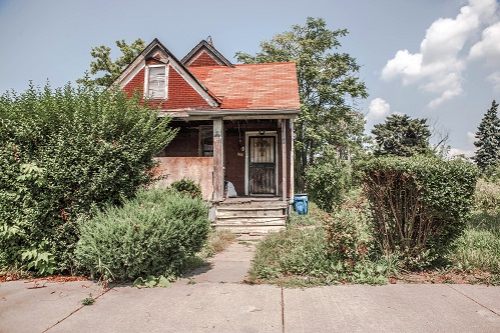- What is earthquake insurance?
- Does home insurance cover earthquake damage?
- What does earthquake insurance cover?
- What is not covered by earthquake insurance?
- How much does earthquake insurance cost?
- What is the deductible for earthquake insurance?
- Where can I buy earthquake insurance?
- How many states have a significant risk of an earthquake?
- Is earthquake insurance worth it?
- FAQ: Earthquake insurance
What is earthquake insurance?
Earthquake insurance is an endorsement or a standalone policy that covers damage to your home and property caused by earthquakes and is sometimes called coverage for earth movement. It covers a range of damage caused by earth movement, including landslides and mudslides.
Does home insurance cover earthquake damage?
No, homeowners insurance doesn't cover earthquake damage. Earth movement is one of the common exclusions on a standard home insurance policy. Your homeowners insurance will only cover earthquake damage if you have purchased an endorsement specifically for that coverage.
Without earthquake insurance, there will be no coverage for any damage done by earth movement.
What does earthquake insurance cover?
Policies differ in terms of what they cover, and there may be options you can add. However, these things are typically covered by earthquake insurance:
- Earthquake damage to the home itself and other structures on the property
- Earthquake damage done to personal property (contents)
- Additional living expenses if earthquake damages make your home temporarily uninhabitable
Like your standard home policy, you will have to pay an earthquake deductible when you file a claim.
Earthquake policies can differ from company to company and state to state. Some may even define the word "earthquake" differently.
As noted above, some policies may cover multiple types of earth movement, while some policies may only cover an earthquake.
Buying earthquake insurance: A checklist
Before you buy earthquake insurance, ask the questions on this checklist:
- Are all types of earth movement (earthquakes, sinkholes and landslides) covered?
- Will the policy cover the cost of stabilizing land beneath the home?
- Does your coverage include replacing the structure, contents, landscaping, and outdoor items, such as swimming pools, hot tubs or fences?
- Are alternate living costs covered if your home is not inhabitable?
- Does the earthquake policy pay the costs of meeting updated building codes?
- Does the policy cover repair to brick, stone or rock veneer?
What is not covered by earthquake insurance?
In general, earthquake insurance doesn't cover anything that is already covered by another policy or coverage on your policy, such as your homeowners insurance or flood insurance (should an earthquake trigger a tsunami, for example).
Earthquake insurance doesn't cover:
- Floods. If a tsunami occurs after an earthquake that floods your area and causes external water damage, earthquake insurance will not cover those damages. Instead, you'd need a flood insurance policy for coverage.
- Fire. If an earthquake ruptured a gas line and caused a fire, for example, your homeowners policy would cover the fire damage.
- Falling objects. Home insurance does cover damage from a tree falling on your house, so that doesn't fall under earthquake coverage.
- Your car. If an earthquake causes damage to your car, it would be covered by your auto insurance as long as you carry comprehensive.
EXPERT TIP: Before you buy any insurance policy, review it carefully. Every policy is different, and what's included with one company may not be with another. For example, some earthquake policies exclude things like fences, pools and landscaping, while others include those in coverage.
How much does earthquake insurance cost?
According to the Insurance Information Institute, earthquake insurance is priced per $1,000 of coverage, and that amount varies depending on the level of risk. In the Pacific Northwest, a homeowner with a frame construction house can expect to pay between $1-$3 per $1,000 of earthquake coverage, while on the East Coast, it would be less than 50 cents per $1,000. That amount goes up for brick or masonry construction - as high as $15 per $1,000 in the Pacific Northwest.
Factors that affect the cost of earthquake insurance include:
- Construction type: frame, brick or masonry
- Number of stories
- Foundation type: slab, raised or basement
- Age of home: Older homes (predating changes to building codes) and not retrofitted
- Location: some areas are at a higher risk of damage.
The type of coverage will affect your premium as well. A policy that covers replacement cost – rebuilding your home with new materials of similar quality -- will be more expensive than one that pays actual cash value, which considers the wear and tear of your home as it currently sits.
The California Earthquake Authority offers an earthquake insurance calculator that will help you to estimate your costs.
What is the deductible for earthquake insurance?
Earthquake insurance deductibles are percentage-based, typically 10% to 20% of the coverage limit. Earthquake insurance policies have a deductible separate from your home insurance deductible.
If you insure your structure for $200,000 and have a 15% deductible, your out-of-pocket expense would be $30,000. If you have bought coverage for the contents of the home or additional living expenses while it's undergoing repairs, you may owe deductibles on those, too.
Earthquakes more than 72 hours apart are usually considered separate events. That would mean a second claim and deductible.
The deductibles, large as they may be, are considered uninsured losses for disaster relief. You may be eligible for low-cost loans to cover them.
Where can I buy earthquake insurance?
Unlike flood insurance, which is available through FEMA (Federal Emergency Management Agency), private insurance companies offer earthquake insurance.
The first step is to get an earthquake insurance quote from your provider if they offer it and then shop around for quotes from other providers as well.
Consumers can sometimes add an earthquake endorsement to their homeowners policy, but this is something to ask insurers when you're shopping around. Not every insurance provider offers earthquake insurance.
Homeowners looking for California earthquake insurance can buy from a private company or the publicly managed California Earthquake Authority (CEA). Your California home insurance company is a good place to start.
"No matter where you get your earthquake insurance policy, you should read it to understand what it does or doesn’t cover," says Ben Deci, senior media officer with the California Earthquake Authority.
How many states have a significant risk of an earthquake?
According to the latest U.S. Geological Survey National Seismic Hazard Maps, all 50 states have some potential for earthquake movement. That isn't to say that every state is likely to have a significant earthquake.
"Most Californians live within 30 miles of an active fault. So, CEA thinks it is wise for Californians to consider earthquake insurance to minimize the possibility of incurring significant financial losses as a result of a damaging earthquake," Deci says.
But you might be surprised that it isn't only California that is at risk for earthquakes. Hawaii and Alaska are at high risk, and so does South Carolina.
Both Oregon and Washington have active seismic zones with the potential for a major quake.
The New Madrid fault runs along the Tennessee state line and affects Arkansas, Missouri and several other states. There are occasionally quakes along the fault, although a large one hasn't occurred in a long time.
According to the USGS, the states with the highest risk for earthquakes are:
- Alaska
- Arkansas
- California
- Hawaii
- Idaho
- Illinois
- Kentucky
- Missouri
- Montana
- Nevada
- Oregon
- South Carolina
- Tennessee
- Utah
- Washington
- Wyoming
Is earthquake insurance worth it?
The answer to whether or not earthquake insurance is worth it depends heavily on where you live and what kind of risk you're willing to take with your financial well-being.
Though earthquakes can happen anywhere, if you live in any of the areas deemed high-risk by the USGS, we recommend strong consideration of adding earthquake insurance to your insurance portfolio. There is peace of mind knowing that if an earthquake occurs, your property and belongings are covered.
FAQ: Earthquake insurance
Does car insurance cover earthquakes?
Yes, your car insurance will cover earthquake-related damage as long as you carry comprehensive (other-than-collision) coverage on your policy.
Does renters insurance cover earthquakes?
No, renters insurance doesn't cover earthquake damage. To cover our personal property for earthquakes, you will need to purchase earthquake coverage.
How does earthquake insurance work?
Earthquake insurance works like any other insurance coverage. You pay a premium for the coverage outlined in the policy, and if you need to file a claim, the policy will cover you up to its limits.




